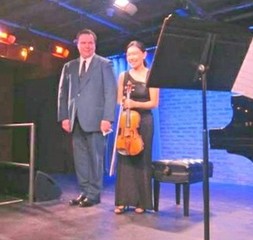|
Back
Moonlight and Shadows New York
Subculture
04/27/2015 -
“Sonatas From The Soviet Era”:
Sergei Prokofiev: Piano Sonata No. 8 in B-flat major, Op. 84
Dmitri Shostakovich: Sonata for Viola and Piano Op. 147
Hsin-Yun Huang (Viola), Ignat Solzhenitsyn (Piano), 92nd Street Y/Subculture (Producers)

I. Solzhenitsyn, Huang H-Y at SubCulture (© Sam von Dogenstein)
Like Maxim Shostakovich, pianist-conductor Ignat Solzhenitsyn had the Gargantuan challenges of growing up in the shadow of a Russian giant, and of knowing that his father was reviled by the powers of the Soviet State. Both children gave up their Russian heritage by coming to America, and while never achieving the awe-inspiring reputations of their fathers, they are both respectable and admirable musicians.
Mr. Solzhenitsyn not only is Conductor Laureate with the Chamber Orchestra of Philadelphia, but he is Principal Guest Conductor of the Moscow Symphony and is in demand as a conductor throughout the world.
But it was his prowess as a pianist which brought him to SubCulture last night. The concert was entitled “Sonatas From the Soviet Era”. That title, though was misleading. If one wanted to hear the “Soviet” Prokofiev or Shostakovich, one could have turned to the kitschy Flourish Mighty Homeland or Shostakovich’s Song of the Forests. The sonatas played last night were far far more personal, they were testaments to composers who had eschewed sheer pleasure for the inner soul.
Mr. Solzhenitsyn’s introduction eloquently explained the difference. Where Sergei Prokofiev had gone through many transformations, with music composed “for the pleasure of writing,” it was this qqEighth Sonata that showed “an unprecedented depth”. Not only because it was one of the three “war sonatas” but because it was a new more inward composer at work.
As for Shostakovich, he had not ever worked abroad, he didn’t understand the cosmopolitan world of Prokofiev, but in this very last work, written in the hospital after an operation, “he had gone beyond external music into the deepest internal feelings.”
After this, Mr. Solzhenitsyn sat at the Steinway and offered Prokofiev’s Eighth Sonata, not with silken skill or concertizing mastery, but with a personal depth, a privately intricate performance.
His large head barely moving, eyes, half-closed, he played the slow sections of the first movement with an austerity belying the simplicity of its themes. The Sonata usually has its own logic, but few pianists can reach it. For most, like Mr. Solzhenitsyn, this is an elusive work. In the opening movement, the key changes almost drift around, the tempos are sudden, from slow to fast, from gentleness to thunder, as if the composer wasn’t certain just what he meant.
But Mr. Solzhenitsyn seemed to embrace that elusiveness. And the second movement, with the enigmatic direction Andante sognando (moving dreamily) did was given that touching feeling. The final Presto energico is, like so much of Prokofiev, a kind of showpiece for the artist. Mr. Solzhenitsyn’s intensity never quite gave that effortless volition which, say, Richter gives it. But mere virtuosity would have been out of place with such intensity.
The second work featured the Taiwanese-American violist, who, like Mr. Solzhenitsyn, frequently returns to her birthplace, as teacher and soloist. In essaying Shostakovich’s final work, written only five days before his death, she was taking on an almost mystical challenge. While Ms. Huang played with a feathery delicacy, perhaps because of my seat, the piano sometimes overbalanced the viola. But this hardly lessoned the memorable results.
The Viola Sonata, like the Prokofiev, began with an enigmatic quietness, broadening into an explosive middle section. The second section was dry, almost arid. But both these movements were preludes for that all-important reason why the composer dedicated the work to the memory of Ludwig van Beethoven himself.
In many of his later works, Shostakovich quoted from other music, but nowhere was it more eloquent than in the ”Moonlight” Sonata here. Was he simply giving homage to Beethoven? Was he saying that his own night had arrived, that moonlight was eternal?
Shostakovich never gave his secrets away. That he had shown deference to Beethoven here, that his allusions and quotes and rhythmic mirror-images were so simple and so effective–and that they were played with such understated seriousness by the two artists–was reason enough to be thankful for the darkness, the shadowy radiance, and the moonlight itself.
Harry Rolnick
|